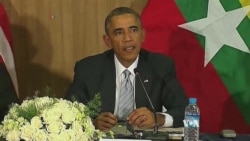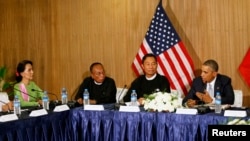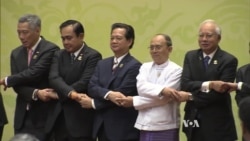President Barack Obama holds talks Friday with Myanmar democracy leader Aung San Suu Kyi, as questions in the Southeast Asian nation mount over the direction and pace of democratic reforms ahead of 2015 elections.
Details of the talks were not available ahead of the meeting in the largest city, Yangon, where the 69-year-old activist spent 15 years under house arrest before the former military government ordered her release in 2010.
Aung San Suu Kyi was elected to Myanmar's parliament in 2012, and her supporters have since sought a constitutional amendment that would allow her to seek the presidency next year. But she has also come under criticism for not taking a tougher public stance against the abuse of Myanmar's mostly Muslim Rohingya minority.
Obama on Thursday voiced confidence over what he called a "new day" in Myanmar, while warning that more work is needed to complete the transition from decades of military dictatorship to full democracy.
Next year's elections need to be free, inclusive and transparent, Obama told Myanmar President Thein Sein at a private meeting on Thursday.
“We recognize that change is hard and it doesn't always move in a straight line,” Obama said during a joint press conference with Sein at the presidential palace in Naypyitaw, the capital. “But I am optimistic about the possibilities for Myanmar.”
In discussions about political and human rights reforms, Obama said he and Sein “recognized that this process is still incomplete.”
Transition to take time
Sein said Myanmar was working to address some of the issues that concerned Obama, but it would take time, adding the country would continue with its transition.
Obama has made democratization in Myanmar, which is also known as Burma, a central part of his policy in Asia. After the country's unexpected shift away from a half-century of military rule, the U.S. rewarded promises of reforms with suspended sanctions as well as visits from high-level officials, including Obama, who first visited in 2012.
Asia visit
The U.S. president is in the middle of a two-day visit to Myanmar. He started his visit attending a summit of the Association of Southeast Asian Nations (ASEAN), which Myanmar is hosting this year.
In remarks to the summit Thursday, Obama said he is looking forward to building on what he said is a strong partnership between the U.S. and ASEAN.
"We are very much invested in building the capacity not just of individual nations but between nations so that together we can become stronger more capable partners of each other and meet the regional and global challenges ahead," Obama said.
The president is also taking part in the East Asia Summit, which is a broader gathering of the 10 ASEAN countries plus eight other nations, including the U.S., China, Russia and India.
In an interview with a Myanmar magazine, the president said that in the two years since his first visit in 2012, he has seen progress that includes economic reforms, the release of political prisoners, and the beginnings of a constitutional reform movement.
But Obama said there has also been some backsliding. Former political prisoners continue to deal with restrictions, while journalists are still facing killings, arrest and harassment.
In private talks with Myanmar's Sein, Obama raised concerns about the pace of political reforms and human rights, specifically identifying the plight of the nation's Muslim Rohingya minority as a concern.
Rohingya issue
About 140,000 Rohingya languish in fetid displacement camps in western Rakhine State after religious violence flared two years ago, leaving about 200 dead.
Though many Rohingya have lived in Rakhine for decades, they are denied citizenship and many other basic rights in Myanmar, where they are instead regarded as illegal immigrants from neighboring Bangladesh.
White House Deputy National Security Adviser Ben Rhodes told reporters here a transition to a stable democracy in Myanmar is not possible without addressing the Rohingya question.
“We recognize that this is a very complex issue here in Burma that they’re deeply held views, that there are contested views of history, but doesn’t change the fact that there are certain fundamental, universal rights that need to apply for all people,” Rhodes said.
Later Friday, Obama heads to Brisbane, Australia, for the G-20 summit, where the subject of Ukraine will likely dominate discussions on the sidelines.
Quiet summit
The two days of wide-ranging ASEAN talks saw no major announcements on key topics such as a binding code of conduct for the South China Sea, but there were reports of sideline talks about China’s recent plan to work with 21 countries to create a new $50 billion development bank. Some governments see the new Asia Infrastructure Investment Bank as a rival to the Asian Development Bank (ADB).
ADB President Takehiko Nakao told VOA the new Chinese-led bank should adopt international standards for procurement, environmental protection and social safeguards for its projects.
“It’s too early to talk about concrete ideas about cooperation," he said. "But if it is established, we are prepared to consider appropriate cooperation.”
Related report by VOA's Steve Herman in Naypyitaw, "Quiet Asia Summits Offer Little on Key Issues"
Also Thursday, the United States announced it would set up a Peace Corps program in Myanmar.
A White House statement said the first Peace Corps volunteers will arrive in Myanmar in late 2015 and will undergo three months of training before moving to their work sites for two years.
Correspondent Steve Herman and White House reporter Luis Ramirez contributed to this report from Naypyitaw, Myanmar. Some material for this report came from Reuters and AP.
















